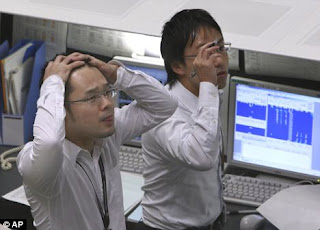
1903
Sep 20, 1903 - 50.000 shares of its stock were issued to the Government of Colombia. The Government is therefore a. very- large shareholder. It now demands that in any disposition that shall be made of the assets of the company it shall receive different and more advantageous treatment than other ... From DICK TURPIN IN BOGOTA. - Related web pagesselect.nytimes.com/gst/abstract.html?res ...
1928
Apr 3, 1928 - Representing 40000 full-paid and non-assessable shares of stock of the par value of 20 Colombian dollars each. of Mortgage Bank of Colombia to be deposited with The New York Trust Company, as Depositary,. or its agent in Bogota, under the Deposit Agreement dated as of March 26, 1928. ... From Display Ad 30 -- No Title - Related web pagespqasb.pqarchiver.com/latimes/access/465338562 ...
1997
Jan 1, 1997 - Article: Colombia Stock Exchange Chooses Tibco To Power Messaging, Integration And Soa Efforts; Software Solutions to Drive Agility and Scalability of ... Inc: Colombia Stock Exchange Chooses Tibco...in High Growth Market(C)1994-2007 M2...that the Colombia Stock Exchange (Bolsa de ... From Alternative Investment Market Definition of Alternative Investment … - Related web pageswww.highbeam.com/doc/1O20 ...
1998
Dec 1998 - The original version was written in English while the author was teaching at Universidad Javeriana in Bogotá, Colombia in December, 1998. Keywords: Stocks, stock markets, inflation, Colombia, Colombian stock market, financial history, real returns on stocks ...The original version was written in English while the author was teaching at Universidad Javeriana in Bogotá, Colombia in December, 1998. Keywords: Stocks, stock markets, inflation, Colombia, Colombian stock market, financial history, real returns on stocks, nominal returns on stocks, non-measurable returns, Colombian firms, CAPM, risk free rate of return, risk premium.
Show more
Show lessFrom SSRN-The Colombian Stock Market: 1930-1998 (El Mercado De Acciones … - Related web pagespapers.ssrn.com/sol3/papers.cfm?abstract_id ...
1999
May 7, 1999 - (This Week In History).(stock market crash on Black Monday, various executives describe impact on their companies)(Brief Article) ... At various times in the United States' history the stock market has risen and fallen, sometimes...Black Monday, Oct. 19, the stock market fell ... From Greenspan Warns of Economic 'Imbalances' Fed Chairman Sees … - Related web pageswww.highbeam.com/doc/1P1-21587851.html?refid ...
2001
May 1, 2001 - Colombian Stock Exchange. ... find Latin Trade articles. COLOMBIA'S stock exchanges in Bogota, Cali and Medellin merged to create the Colombian Stock Exchange, which will ... From Colombian Stock Exchange. Article from Latin Trade HighBeam … - Related web pageswww.highbeam.com/doc/1G1-75211244.html?refid ...
2004
Nov 22, 2004 - História da Bolsa de Valores do Rio de Janeiro [History of the Rio de Janeiro Stock Exchange] Magazine article from: Business History Review; October 1, ... Colombia Stock Exchange Chooses Tibco To Power Messaging, Integration And Soa Efforts; Software Solutions to Drive Agility and ... From Argentina: Bolsa de Comercio expects IPOs to resume in 2005. Article … - Related web pageswww.highbeam.com/doc/1G1-125058698.html?refid ...
2006
Jun 12, 2006 - The Colombian benchmark stock index fell 10.5 percent to 6749.74, its biggest decline since the exchange was opened in 2001. ... Foreign and national investors have snapped up Colombian stocks in recent years to take advantage of the stock market's exceptional returns. ... From Colombia's stock market suffers largest one-day plunge in history. - Related web pageswww.accessmylibrary.com/premium/0286/0286 ...
2007
Aug 22, 2007 - BOGOTA, Aug 22 (Reuters) - When Diana Marcela Pena called a stock broker last week about buying shares, it was something she had never dreamed ... to Colombian investors, the biggest financial deal in the country's history, was too much for the 34-year-old graphic designer to resist. ... From Ecopetrol deal to deepen Colombian stock market - Related web pageswww.reuters.com/article/bondsNews ...
2008
Jan 28, 2008 - Most stocks in Colombia fell as investors took the opportunity to sell after the index rose the most in five months last week, Juan Antonio ... Colombia may sell a 56 percent stake in the electricity company in the second half of this year, Finance Minister Oscar Ivan Zuluaga told ...










.jpg)